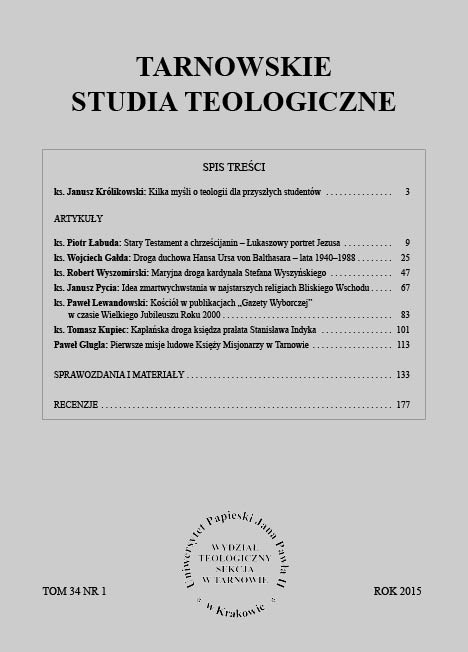Kapłańska droga księdza prałata Stanisława Indyka
DOI:
https://doi.org/10.15633/tst.1566Słowa kluczowe:
diecezja tarnowska, ks. Stanisław Indyk, Tarnów-Mościce, duszpasterstwoAbstrakt
Życie ks. Stanisława Indyka stanowi dla kapłanów przykład realizacji powołania, a dla wiernych świeckich jest wyraźnym drogowskazem w drodze do Boga. Po otrzymaniu święceń kapłańskich pracował jako wikariusz i katecheta. Następnie pełnił posługę ojca duchownego i prefekta w Seminarium Duchownym w Tarnowie. W trudnych czasach wojny i okupacji otaczał pasterską troską swoich parafian w Tarnowie-Mościcach. Zorganizował ośrodek tajnego nauczania, rozwijał pomoc charytatywną oraz budował nowy kościół parafialny. Wytężona praca duszpasterska odbiła się na jego zdrowiu. Przeżył 80 lat, służąc z oddaniem Bogu i ludziom.Bibliografia
Ludwiczak M., Wspomnienie o ks. Indyku, [w:] Księga pamiątkowa z okazji 50-lecia kapłaństwa księdza Stanisława Indyka (mps), Archiwum Parafialne w Mościcach.
Nowak A., Słownik biograficzny kapłanów diecezji tarnowskiej, 1786–1985, t. 3, Tarnów 2000.
Rzeczpospolita Mościcka, red. P. Pawlina, Tarnów 2007.
Schematyzm diecezji tarnowskiej na rok 1992, część I historyczna, red. J. Rzepa, Tarnów 1992.
Smoła M., IV Liceum Ogólnokształcące im. Stanisława Anioła w Tarnowie 1945-2005: Szkoła i ludzie. Zarys monograficzny, Tarnów 2005.
Pobrania
Opublikowane
2015-12-31
Numer
Dział
Artykuły
Licencja
Autorzy publikujący w czasopiśmie udzielają jego wydawcy zgody o następującej treści:
- Autor zachowuje autorskie prawa majątkowe do utworu, a jednocześnie udziela wydawcy czasopisma zgody na jego pierwszą publikację w wersji drukowanej i wersji online na licencji Creative Commons Uznanie autorstwa 4.0 Międzynarodowe oraz zgody na wykonywanie opracowań, w tym przekładów.
- Autor ma możliwość udzielania zgody niewyłącznej na opublikowanie utworu w wersji, która ukazała się w czasopiśmie (np. zamieszczenia go w repozytorium instytucjonalnym lub opublikowania w książce), wraz z informacją o jego pierwszej publikacji w czasopiśmie.
- Autor może umieścić swój utwór online (np. w repozytorium instytucjonalnym lub na swojej stronie internetowej) jeszcze przed zgłoszeniem utworu do czasopisma.

